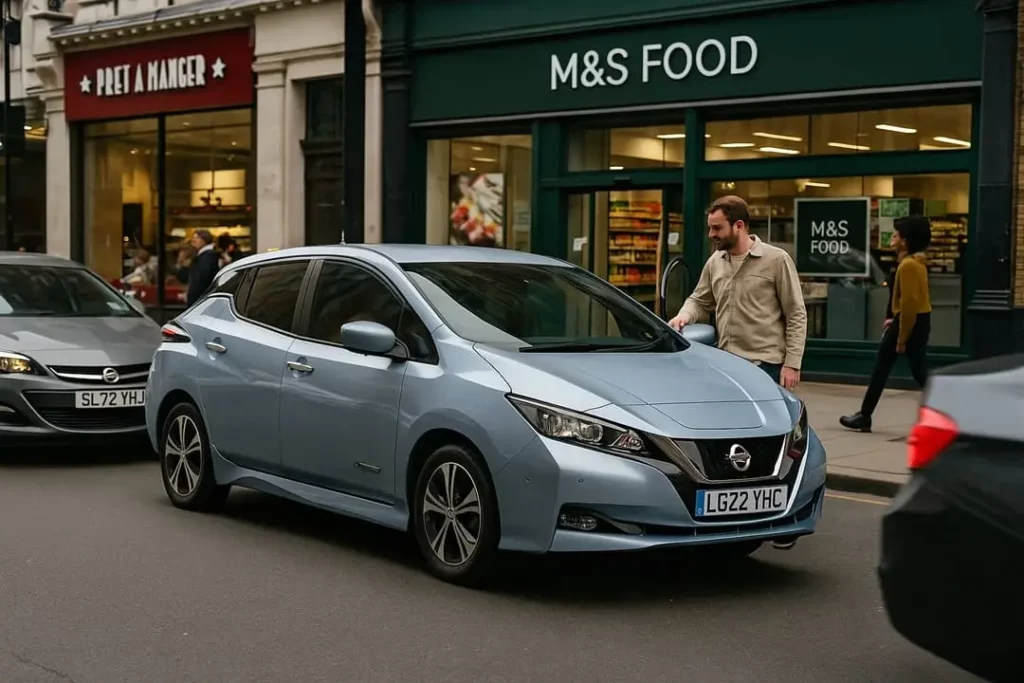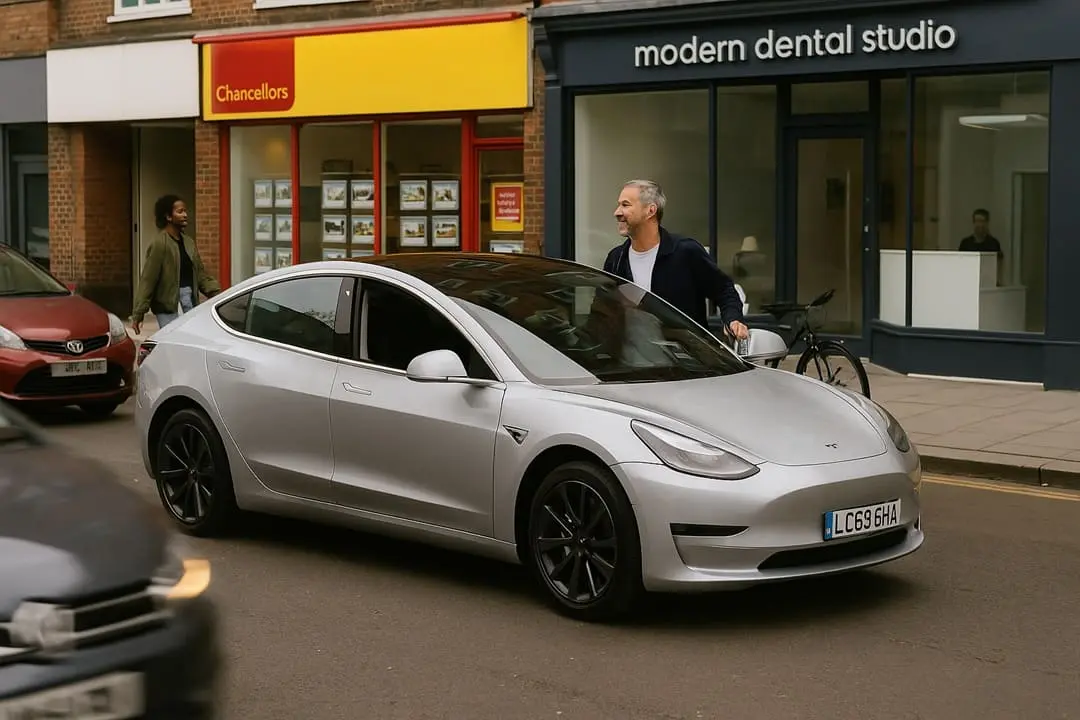A Review by the Auto Motive Electronic Editorial Team
From Novelty to Norm – How EVs Went Mainstream
There was a time not long ago when spotting an electric vehicle on the road felt like catching a glimpse of the future. They hummed silently past petrol stations, sleek and slightly mysterious, often driven by early adopters in high-tech circles or eco-minded pioneers. Fast-forward just a few years, and that quiet hum has become part of the everyday soundtrack in towns and cities across the UK and Europe.
Electric vehicles (EVs) have moved well beyond the niche. In the rental and carsharing world, they’re no longer a rare offering for curious drivers — they’re becoming a core part of the fleet. Whether it’s a Tesla Model 3 parked near King’s Cross or a Renault Zoe waiting outside a hotel in Frankfurt, electric cars are steadily claiming their space in the industry.
What’s Driving the Change? (Spoiler: It’s Not Just the Environment)
It would be easy to pin the rise of EVs on the green movement alone — and sure, lower emissions and sustainability are strong selling points. But for many UK drivers and tourists alike, the motivation is more practical. Electric vehicles are cheaper to run. No fuel stops, fewer moving parts to service, and in many cities — like London — access to low-emission zones without paying the hefty ULEZ charge.
Then there’s the driving experience. The instant torque, the quiet cabin, and the surprising acceleration all combine to deliver a ride that often feels more refined than its petrol or diesel counterpart. And crucially, people are no longer intimidated by the idea of going electric. Range anxiety has eased, the tech is more intuitive, and charging networks are finally catching up — at least in urban areas.
The perception has shifted. An EV is no longer a compromise. In many cases, it’s the better car for the job — especially when it comes to city driving and short-term use.
How Rental Companies Are Adapting

It didn’t happen overnight, but the rental giants have taken note. Walk into a major car hire branch at Heathrow or Gatwick today, and it’s not unusual to see an electric option on the lot. Enterprise began adding EVs to its UK fleet years ago, and Europcar now actively promotes electric rentals in several European capitals. In cities like Amsterdam, Paris, and Berlin, the shift is even more visible — entire fleets of electric vehicles line the streets, ready to be booked by the hour or the day.
Even smaller, more agile services are joining the charge. Take Getmancar, for instance — a rental company originally operating in Eastern Europe. They’ve recently entered markets like Germany, and while not a household name in the UK just yet, they’re an example of how quickly the landscape is changing. Their Berlin fleet already includes several fully electric models — not as a novelty, but as a standard offering, integrated into daily urban life.
What’s more, electric cars tend to suit the rental business. Their low running costs and minimal maintenance mean fewer headaches for providers. And for renters, especially younger users familiar with app-based systems, the learning curve is almost nonexistent.
Carsharing + EV = A Perfect Match?
It’s no accident that EV adoption has accelerated most in carsharing. The model fits like a glove. Most carsharing trips are short, often within a few miles. Drivers pick up a car, run errands, meet friends, or get to work — all without burning a drop of petrol. Electric vehicles thrive under those conditions.
In Berlin, Share Now has made EVs a visible part of its fleet, scattering BMW i3s and Fiat 500e models across the city. Paris has followed a similar path. And in London, services like Zipcar now offer fully electric options as part of their hourly rental system. The message is simple: if you’re only driving a few miles, why not go electric?
Even better, EVs in carsharing schemes are often parked at designated charging spots. So when you’re done, you just plug in and walk away. No refuelling, no last-minute petrol station dash. It’s a convenience thing as much as a climate thing — and people are noticing.
The Charging Question – Is the Infrastructure Ready?

This is where things get complicated. While the appetite for electric rentals is clearly growing, the reality of charging can still be a sticking point. In cities like London, Manchester, and Birmingham, the infrastructure has made big leaps. Public charging stations are now common in supermarket car parks, service stations, and on residential streets. In fact, as of early 2025, the UK passed the 60,000 public charger mark — a significant milestone and one that’s only set to grow.
But outside urban hubs, the picture isn’t quite as rosy. Rent an EV in Cornwall or the Scottish Highlands, and you might find yourself planning routes more carefully than you’d like. That’s not to say it’s unworkable — just that spontaneous detours might come with a little more risk. For short city hires, it’s no issue. For longer countryside getaways, it takes planning.
Car rental companies are responding. Many offer guidance on nearby chargers or include EVs with longer ranges — like the Tesla Model Y or Polestar 2 — to give users more flexibility. Some even partner with providers like BP Pulse or Shell Recharge to offer discounted access. Still, the infrastructure conversation is far from over. And until chargers are as common as petrol pumps, range confidence will remain part of the EV rental equation.
The Future Outlook – What’s Next for EV Rentals?
If the current trends continue — and all signs suggest they will — the future of car rentals is electric. Not just in London or Berlin, but across the continent. Governments are putting pressure on rental fleets to decarbonise, customers are asking for cleaner options, and manufacturers are doubling down on electric models. The EU’s plan to phase out the sale of new petrol and diesel cars by 2035 is already rippling through the rental sector.
In the UK, there’s growing momentum behind local councils supporting EV-friendly initiatives — from zero-emission zones to dedicated parking spots for electric hire vehicles. Carsharing operators are aligning with this vision, creating services that not only meet consumer needs but contribute to wider urban sustainability goals.
For drivers, this means more choice, less hassle, and — let’s be honest — a more enjoyable drive. Whether you’re picking up an EV for a business trip from Manchester Piccadilly or using a shared Nissan Leaf to get around Brighton for the weekend, the transition feels smoother every year.
The electric future isn’t coming — it’s already here, quietly humming through our cities and changing the way we rent, drive, and think about transport.
